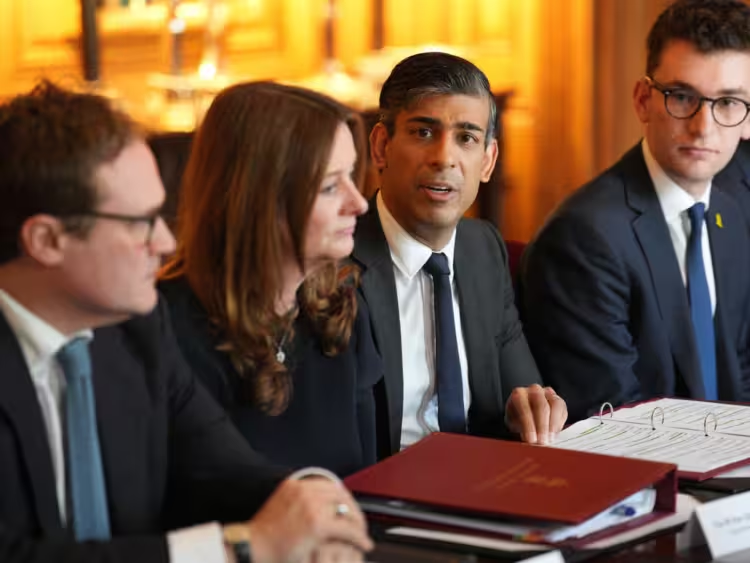By Lucy Caulkett-
Vice Chancellors from some of the UK’s leading universities will convene with government officials to address the escalating issue of antisemitic abuse on campus.
The meeting, attended by the Prime Minister, Education Secretary, Communities Secretary, and Security Minister, aims to advocate for a zero-tolerance approach towards antisemitic abuse and safeguard the learning environment for all students.
While emphasizing the importance of free debate and exchange of ideas in universities, the government emphasised that such discussions must never transgress into hate speech, harassment, or incitement of violence.
Speaking ahead of the roundtable, Ms Keegan told Sky News: “What we don’t want is our campuses becoming unsafe environments for students or staff and going down the route that you see in other places like the US.”
When asked whether there is a fear that events in the US will be replicated in the UK, Ms Keegan said: “There’s always a fear of that.
“There is always a contagion fear and obviously there are some groups that are encouraging this as well.”
The Education Secretary told the Sky News that there are “rumours” that people in the US are talking to student groups in the UK.
This call for action is timely, as recent protests across various university campuses in the UK have highlighted the level of injustice felt by Pro-Palestinian campaigners.
However, it is crucial to emphasize that these protests should not justify any form of hate speech or victimization of Israeli pupils.
The meeting will also serve to inform upcoming government guidance on combatting antisemitism on campus.
Additionally, the Office for Students (OfS) has pledged to release the response to its consultation on a new condition of registration, potentially granting OfS the authority to impose sanctions on universities failing to adequately address harassment, including antisemitic abuse.
In the Chancellor’s Autumn Statement, £7 million of additional funding was allocated to tackle antisemitic abuse in educational settings.
A portion of this funding, £500,000, will bolster the University Jewish Chaplaincy’s efforts in supporting Jewish students on campus. Currently, the University Jewish Chaplaincy provides assistance to over 8,500 students across more than 100 universities in 13 regions, aiding them in dealing with incidents of antisemitism and intimidation.
Prime Minister Rishi Sunak emphasized the importance of universities as both arenas for robust debate and havens of tolerance and respect for all community members.
He denounced the disruption caused by a vocal minority on campuses, stressing the need to halt outright harassment and antisemitic abuse.
Education Secretary Gillian Keegan echoed these sentiments, affirming the imperative for universities to crack down on antisemitism and ensure that protests do not unduly disrupt university life.
She welcomed Vice Chancellors to No10 to collaborate on implementing clear steps to protect Jewish students on campus.
The Union of Jewish Students (UJS) has condemned the “toxic environment” faced by Jewish students nationwide, citing a 203% increase in university-related antisemitic incidents between 2022 and 2023, according to the Communities Security Trust.
Ministers stressed that the necessity for universities to swiftly implement disciplinary action against students inciting racial hatred or violence and urged them to involve the police where criminal acts are suspected.
The Education Secretary’s recent communication to Vice Chancellors outlined government expectations regarding the support provided to Jewish students.
Representatives from the Union of Jewish Students will also participate in the roundtable discussion, sharing their experiences and perspectives.
The Prime Minister and Education Secretary plan to use this opportunity to exchange best practices and seek input on how the government can further support universities in combating antisemitic abuse, fostering an inclusive and safe environment for all students.
Pro- Palestinian campaigners feel the British and the U.S government are not standing up to Israel for what they consider to be unfair attacks and genocide of Palestinians by the Israeli government.
Israel has been accused of reckless and indiscriminate killing of Palestinian civilians , a third of which were children, furthering the dispossession of Palestinians in Israel, and encouraging apartheid between the two nations.
Amnesty Investigation
An investigation by Amnesty International revealed that Israeli army had committed violations of International law.
According to its findings. the Israeli government did this by ‘failing to take feasible precautions to spare civilians, or by carrying out indiscriminate attacks that failed to distinguish between civilians and military objectives, or by carrying out attacks that may have been directed against civilian objects’.
Amnesty’s report stated that politicians who incited racial hatred, and proposed to annex Palestinian territory and forcibly deport Palestinians, were given military and policing responsibilities by the Benjamin Netanyahu government.
It made reference to the beaten of men, women and children worshipping at Al-Aqsa mosque in Jerusalem by Israeli forces and the arrest of 450 Palestinians on the mosque esplanade, later released barefoot and beaten.
However, the war between Israel and Palestine is deeply complex and historical.
The Palestinian militant group Hamas launched an unprecedented assault on Israel on 7 October, with hundreds of gunmen infiltrating communities near the Gaza Strip.
About 1,200 people were killed, and more than 250 were taken to Gaza as hostages, according to Israeli tallies.
Israel has occupied East Jerusalem and the West Bank for over 50 years including most of the Syrian Golan Heights, Gaza and the Egyptian Sinai peninsula.
Most Palestinian refugees and their descendants live reside in Gaza and the West Bank including neighbouring Jordan, Syria and Lebanon.
Neither they nor their descendants have been allowed by Israel to return to their homes because Israel says this would overwhelm the country and threaten its existence as a Jewish state.

